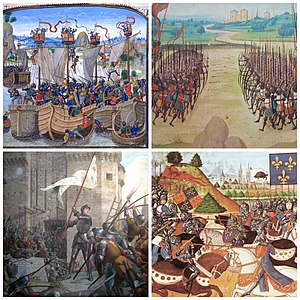
Hundred Years' War
Medieval Anglo-French conflicts, 1337–1453 / From Wikipedia, the free encyclopedia
Dear Wikiwand AI, let's keep it short by simply answering these key questions:
Can you list the top facts and stats about Hundred Years' War?
Summarize this article for a 10 years old
The Hundred Years' War (French: La guerre de Cent Ans; Picard: Dgère d'Un Chint An; 1337–1453) was a series of armed conflicts fought between the kingdoms of England and France during the Late Middle Ages. It originated from English claims to the French throne. The war grew into a broader power struggle involving factions from across Western Europe, fueled by emerging nationalism on both sides. Despite its name, the war actually lasted 116 years, interrupted by several truces.
Hundred Years' War Edwardian phase (1337–1360) | |
|---|---|
|
Hundred Years' War Caroline phase (1369–1389) | |
|---|---|
Hundred Years' War Lancastrian phase (1415–1453) | |
|---|---|
|
The Hundred Years' War was a significant conflict in the Middle Ages. During the war five generations of kings from two rival dynasties fought for the throne of France, which was then the dominant kingdom in Western Europe. The war's effect on European history was lasting. Both sides produced innovations in military technology and tactics, including professional standing armies and artillery, that permanently changed warfare in Europe; chivalry, which reached its height during the conflict, subsequently declined. Stronger national identities took root in both countries, which became more centralised and gradually rose as global powers.[1]
The term "Hundred Years' War" was adopted by later historians as a historiographical periodisation to encompass related conflicts, constructing the longest military conflict in European history. The war is commonly divided into three phases separated by truces: the Edwardian War (1337–1360), the Caroline War (1369–1389), and the Lancastrian War (1415–1453). Each side drew many allies into the conflict, with English forces initially prevailing; however, the French forces under the House of Valois ultimately retained control over the Kingdom of France. The French and English monarchies, previously intertwined, thereafter remained separate.
